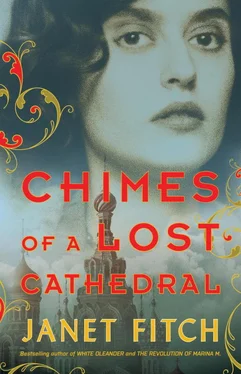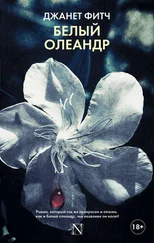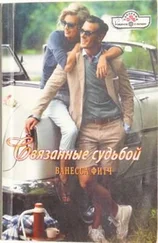“We’re home,” I whispered to Iskra, kissing her hair. She needed a bath, and her arm was still tender, but she was alive. We were both alive—and going home. I blubbered, letting my tears wet her hair. Somewhere in this maze of a city, Kolya lived. I felt him out there somewhere, making deals, living his subterranean life. I have your daughter, Kolya. Can you feel us coming? I imagined him stopping in the middle of whatever he was doing—midsentence, in an office, or a courtyard, as the image of me crossed his mind. While hundreds of miles to the east, a naked man lay on a train track with a bullet in his chest. And in some small railroad town, a boy with brown eyes remembered the redheaded baby he had saved, and her mother’s tears.
Before we were able to leave the car, the railroad Cheka arrived. Too late to jump off the train now. We sat on the berths while a sharp-faced man in leather examined our papers. He was quite literate, too bad for me. “Why is your residence in Tikhvin but your propusk from the Izhevsk Soviet?” I had to explain the Red October, the baby, the agricultural work. I showed him Iskra’s baptismal certificate—he sneered at that bit of backsliding. I shrugged. “Peasants.” I showed him my hands, the calluses from working the crops, though I didn’t explain the scar on my right palm, courtesy of the Archangel. I had, however, replaced my bloodstained boots with my woven bast shoes. My eyeballs burned with the effort of not looking at the agronomist’s valise nestled under the bunk across from us, wishing it would disappear. Unfortunately, the Chekist had eyes in his head. He lifted it out.
The generalized sense of anxiety heightened, a twang, like the tightening of a string, as if everyone had been guilty of doing away with him, or was afraid they would be accused of it.
“Whose is this?” he asked.
I should have thrown it out the window, but that would have been too obvious.
“There was a man here,” said the shipping clerk from Eliseev’s. “He disappeared, after Vologda.”
The hatchet-faced Chekist tried to open the bag. Locked. The boy was staring at me. I glanced back as if it was of no interest to me whatsoever, but I could feel sweat trickle down my neck and under my arms. Iskra was sweating too, her red hair plastered to her skull. I kissed her, swayed her a bit in her bloodstained sling. It was airless and hot in the car without the train movement. I sent Yasha the telepathic message: Nobody beat you, you got your own bunk—do you really want to make trouble? You don’t know how far this might go.
“An agronomist, didn’t he say, Talya?” said the spets. “From Ekaterinburg. Though he didn’t seem like any agronomist I’d ever met.”
“A very unpleasant man,” his wife chimed in.
I waited. Iskra’s good arm came up, playing with my nose, my lip. Her other in its sling. What would happen to her if the Cheka arrested me? Please, God, get us through this. I hoped I looked like a sad-eyed redheaded Theotokos. Who would suspect a Virgin and Child of murder? I felt the weight of the gun against my belly. Please let him not search too closely. Had anyone, of all these hundreds, mentioned the shot in the night, the recognizable figure of a woman with a child skulking through the car? I could only depend upon the way people minded their own business these days. Why should they help the Cheka?
“ Mal’chik, what do you know about this man with the suitcase?” the Chekist asked the boy.
I let my eyes rest on the timber man, who was pressing his abdomen with his fingertips, something not working in his bowels, and steeled myself in anticipation of the spets ’s son spilling his guts. “He was fat. And he snored,” the boy began in an overearnest voice. “He wore a big metal buckle, like a sheriff .” He pronounced it sharif. A Zane Grey fan. Yes, the belt would have caught his attention. It was riding the rails somewhere, around the waist of a Vologda orphan. “He played chess. He had a little tiny set and he beat everyone. He didn’t want to teach me.” The screwed-up face as the little liar thought of other facts about the man he could share. “He was from Ekaterinburg. Talked about the war. He knew a lot about it.”
“What did he say about the war?” the Chekist asked.
The mother was making eyes at him. Be quiet! The boy paused. “He knew a lot,” he continued. “He said the English were going to abandon the Whites. That they didn’t trust Yudenich or he’d have Petrograd already. I think he was a spy. An English spy.”
The Chekist was clearly disappointed in the boy’s information. “Anybody else know anything about this man?”
“He just disappeared,” said the timber man, his breath sour with indigestion. “After we’d left Vologda. I thought he’d passed out, but I guess not.”
“He came on the train stinking drunk,” added the spets ’s wife.
“The English were in Vologda,” said the shipping clerk. “Maybe he joined them.”
“And left his bag?” The sober, thin-faced Chekist clearly didn’t like the bag. That’s what was troubling him.
The shipping clerk scratched his head. It made me want to scratch.
“Maybe he wandered off at one of the stations and missed the train,” I said, not to be left out of the general guessing. Thinking about the dead man’s advice, what makes the guilty look guilty. If the innocent were putting in their comments, I needed to join them. Not be the one visibly inching for the door.
“Or maybe it was supposed to be picked up by someone else, like in Pinkerton, ” said Yasha. “His contact. ” Supporting the spy theory. But the way he looked at me, I knew he knew. He was doing this for me.
The Chekist spat on the floor of the train. Where someone would have to sit later. “The simplest explanation,” said the timber man, “is that he went for a smoke and fell off. He was in pretty bad shape.”
“Well, tough luck for him.” The Chekist tucked the case under his arm, and moved on through the car.
In a few minutes, they unlocked the doors, and we spilled out onto the platform at the Nikolaevsky station. I loved every member of this sweating, shoving crowd, the high arched roof covered in soot and fluttering with pigeons, the patched but decidedly urban clothing, the begging orphans. I loved it all. We were back among the living. We were home.
Part II
Petrograd
(Autumn 1919)
Nikolaevsky station soared before my eyes, a city within a city, just as I’d left it ten months ago. Dirty and crowded, but a beautiful sight regardless. “Here it is, Iskra. This is where we’re from.” She gazed up at the rosettes on the smoky ceiling. Perhaps not as impressive as I’d hoped for her first introduction, but what did she know. The station hadn’t changed, though the people looked a little sicker than before, skinnier, and more resigned—as if they’d been waiting for centuries. Maybe they weren’t even traveling anymore. “Traveling” had perhaps become a permanent condition. Ten months ago, I’d left this station a girl delirious with love, on the brink of a great adventure. Now I had returned, the prodigal, sans swagger, sans lover, with an infant in her arms, the Izhevsk Committee’s pail over one arm, all my worldly goods in a little satchel. The Petrograd Soviet had not sent a welcoming committee. I kissed Iskra, checked her arm. “We’re home, milaya .”
Beggar children seemed to outnumber the passengers now, besieging them with their outstretched hands. A woman my own age, perhaps a young teacher, knelt to address two tiny children, holding something out in her hand, trying to coax them closer, the way you tamed animals. She’d almost lured them to her when a gang of them swooped in and hurried the little ones away.
Читать дальше












